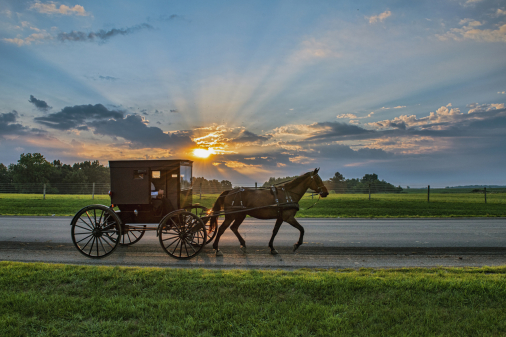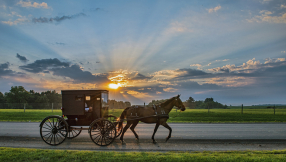
From questioning the use of technology to taking the Bible very seriously, we can learn more than quilt-making and horse-and-buggy riding from these quirky American communities.
The Amish are a tight-knit Christian community who are best known for their eccentricities – funny bonnets, horse-drawn carriages, identical dress, not having electricity, and their deeply conservative values, for example.
This has drawn a lot of interest from the modern world in recent years, leading to a thriving tourist industry and numerous TV series to observe the quaint ways of these traditionalist people.
The faith of these communities is often ignored – yet they would say that it is the foundation of their unusual lifestyle. Can modern Christians learn from their unique interpretation of scripture?
Radical acceptance of Reformation principles
In many ways the Amish are a window into the past, as they have held on to traditions and their way of life since their beginnings in the radical wing of the Protestant Reformation known as the Anabaptists.
They and their related Mennonite communities were forced to move to the US in the 18th and 19th centuries, fleeing persecution from other Christians, and it is in the USA where they have managed to hold on to their ways.
As Anabaptists, they took Reformation principles seriously and refused to compromise, with the result that other Christians often persecuted them. Yet some of their theological disagreements of the time are widely accepted by Protestants today, such as adult baptism.
Taking the Bible very seriously
Some of the quirks of Amish (and the related Mennonite societies) are due to taking the New Testament very literally. Women wear head coverings, church leaders are drawn by lot, there are clear gender roles, for example. Such practices are seen to have other spiritual purposes such as encouraging humility – and being separate from the ‘world’.
These ideas might be criticised as legalistic or fundamentalist by many Christians today. Yet this devotion to the Word can have undeniably powerful effects. For example, the dedication of the Amish to the teachings of Jesus on forgiveness have led to public expressions of grace and mercy that were a powerful witness to the Christian faith.
Most famously, when the disturbed Carl Roberts decided to enact his revenge on God for the miscarriage of his child by taking young Amish girls hostage and then shooting 10 of them in 2006, killing six, the response of the traumatised Amish community was to extend grace towards the family of the shooter, an act that made headlines around the world and became the focus of the 2010 film “Amish Grace”, as well as several books.
Scepticism about technology
Perhaps this is what the Amish and Mennonite communities are best known for – no phones, electricity, cars or television. However there are many different churches and they vary in the extent that they will reject or adopt technology. They may do so by judging whether it will harm their faith, family and community bonds, on a case by case basis. So some churches will allow cars but not tractors – others the opposite. And they will consider whether the technology will help or hinder what is important to them, such as faith and community, rather than adopting it without thinking because it appears to make life easier.
Today's ‘developed’ societies face the frightening consequences of artificial intelligence, the harm caused by social media to young people and to our public discourse, and widespread breakdown in family and community bonds. Perhaps we too should be more discriminating about the technology that we allow into our lives?
Practising submission
In English, the word ‘submission’ has negative associations with oppression and abuse. However the word in the old language used by the Amish, ‘Gelassenheit’, is an important part of their spiritual practice and said to be their source of peace. Most important to them is submission to God, but also to the church and community. For example, if a decision is made by the leaders, the community will accept it even if they don’t agree (or create a separate church). This principle seems one way they have kept their traditions and unusual lifestyle despite all the temptations of modernity. Uniformity within a church community is expected.
Submission to parents, leaders, husbands in a traditional understanding of scripture is also important to these communities. This is more controversial in modern Western societies. But do we need to learn more submission in our spiritual lives – at the very least to God? With the rise in atheism, disunited churches and spiritual confusion and unrest, perhaps we can listen to these Anabaptist brothers and sisters to at least learn more about the concept of submission, even if not follow it to their extremes.
Separation from the State and its power
The Amish think it is important to be self-sufficient and independent from the government. They live this out in a number of ways. They don’t accept government aid and welfare – instead having their own funds that they distribute to people in need. They also run their own schools, not wanting their children to be influenced by the ‘worldly’ teaching of public schools.
This independence also enables more radical following of Jesus’s commands, such as loving enemies, as the Amish will not send their people to war if there is conscription.
Modern Christians are often not aware of how much our dependence on government has increased because it has happened so incrementally. It has often become a ‘god’ that we look to for our security. But what would happen if the system broke down or became more authoritarian or oppressive? There are advantages to keeping a distance from structures of power.
Valuing ‘tradition’ rather than searching for ‘progress’
The modern Western world often has an unconscious bias towards anything that changes society, thinking it will be for the better. Genuine conservatives who want to preserve tradition appear to be rarer. Yet the deeply conservative Amish show some of the benefits of being sceptical about progressivism, which can help to provide a more balanced view.
Maintaining close family and community ties through everyday tasks
Many quaint Amish traditions, such as communal quilt making, ‘barn raising’ where a community comes together to build a barn for a member, and canning (preserving fruit and vegetables) have a practical function, but they are also a means by which people can come together, support one another and build relationships.
Being close to nature and the land
Many Amish are farmers, and their early beginnings were inspired by the Genesis 1 instruction to steward the Earth in their work. The combination of this preference and the distancing from technology is that their old ways are much more environmentally sound than modern farming. They are also self-sufficient and more resilient should troubles come.
Heather Tomlinson is a freelance Christian writer. Find more of her work at https://heathertomlinson.substack.com/ or via X (twitter) @heathertomli









